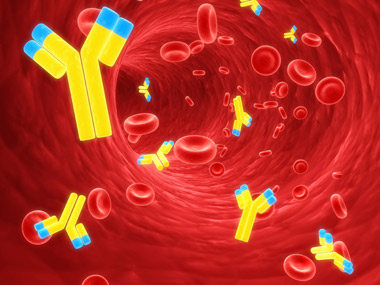Skip subpage navigation
What is Immunity?
 Immunity is your body's ability to recognize germs to prevent them from causing illness. The immune system's job is to help identify and eliminate dangerous germs that enter the body before they can cause disease or damage. There are two types of immunity: innate and adaptive.
Immunity is your body's ability to recognize germs to prevent them from causing illness. The immune system's job is to help identify and eliminate dangerous germs that enter the body before they can cause disease or damage. There are two types of immunity: innate and adaptive.
Innate Immunity
Innate immunity is the immune system that is present when you are born. It is your body's first line of defense against germs. It includes physical barriers, such as skin and mucous membranes, and special cells and proteins that can recognize and kill germs. The problem with these special cells and proteins is that they can kill a germ, but once the germ is dead, the innate immune system forgets it. It does not communicate any information about the germ to the rest of the body. Without this information, the body cannot prepare itself to fight this germ if it should reinfect the body.
Adaptive Immunity
Adaptive immunity is protection that your body builds when it meets and remembers antigens, which is another name for germs and other foreign substances in the body. When your body recognizes antigens, it produces antibodies to fight the antigens. It takes about 14 days for your body to make antibodies. More importantly, the body memorizes this fight so that if its meets the same antigen again, it can recognize and attack more quickly. Antibody production is one of the most important ways that immunity is developed.
There are two types of adaptive immunity: active and passive.
- Active Immunity - antibodies that develop in a person's own immune system after the body is exposed to an antigen through a disease or when you get an immunization (i.e. a flu shot). This type of immunity lasts for a long time.
- Passive Immunity - antibodies given to a person to prevent disease or to treat disease after the body is exposed to an antigen. Passive immunity is given from mother to child through the placenta before birth, and through breast milk after birth. It can also be given medically through blood products that contain antibodies, such as immune globulin. This type of immunity is fast acting but lasts only a few weeks or months.
How vaccines work with the immune system
Vaccines provide active immunity to disease. Vaccines do not make you sick, but they can trick your body into believing it has a disease, so it can fight the disease. Here is how a vaccination works:
- The vaccine is administered. It contains antigens to a specific disease.
- The immune system identifies the antigens in the vaccine as foreign invaders.
- The immune system then develops antibodies to neutralize the antigens.
- The immune system stores these antibodies for future use in case the person is ever exposed to the disease.
Vaccines are given to prevent and eventually wipe out diseases. When a vaccine is given to a significant portion of the population, it protects those who receive the vaccine as well as those who cannot receive the vaccine. This concept is called "herd immunity." When a high percentage of the population is vaccinated and immune to a disease, they do not get sick -- so there is no one to spread the disease to others. This herd immunity protects the unvaccinated population from contagious (spread from person to person) diseases for which there is a vaccine.
References
You are leaving Health.mil
The appearance of hyperlinks does not constitute endorsement by the Department of Defense of non-U.S. Government sites or the information, products, or services contained therein. Although the Defense Health Agency may or may not use these sites as additional distribution channels for Department of Defense information, it does not exercise editorial control over all of the information that you may find at these locations. Such links are provided consistent with the stated purpose of this website.
You are leaving Health.mil
View the external links disclaimer.
Last Updated: July 19, 2023